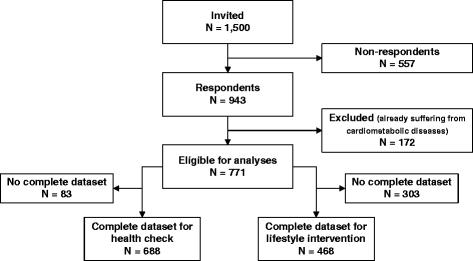Willingness to participate in prevention programs for cardiometabolic diseases
- PMID: 25637105
- PMCID: PMC4323020
- DOI: 10.1186/s12889-015-1379-0
Willingness to participate in prevention programs for cardiometabolic diseases
Abstract
Background: Cardiometabolic diseases are the leading cause of death worldwide and result in decreased quality of life for patients and increased healthcare costs. Population-based prevention programs may prevent the onset and development of cardiometabolic diseases. The effectiveness of these programs depends on participation rates. This study identified factors related to willingness to participate in health checks and lifestyle intervention programs to prevent cardiometabolic diseases.
Methods: A questionnaire was sent to 1,500 Dutch adults, participating in the Dutch Health Care Consumer Panel of NIVEL. The questionnaire was developed by NIVEL. Predictors of willingness to participate were identified with logistic regression analyses. Predictors investigated were socio-demographic variables, risk factors for cardiometabolic diseases and motivational aspects.
Results: The response rate was 63%. 56% of the participants in our study were willing to participate in a health check. Higher age was associated with increased willingness to participate, as was the desire to know the actual risk for cardiometabolic diseases (OR = 4.6). Becoming unnecessarily worried was identified as a barrier (OR = 0.3). 47% were willing to participate in a lifestyle intervention program. People aged 39-65 were most willing to participate. Attention for prevention relapse behavior (OR = 3.3), informing the general practitioner about results (OR = 2.6) and conducting the program in a group (OR = 2.0) were positively associated with willingness to participate in lifestyle interventions.
Conclusions: Willingness to participate in a health check depended on personal beliefs, whereas social aspects contributed most to willingness to participate in a lifestyle intervention program. This information can be used to optimize and tailor the promotion of prevention programs.
Figures
Similar articles
-
Personalized prevention approach with use of a web-based cardiovascular risk assessment with tailored lifestyle follow-up in primary care practice--a pilot study.Eur J Prev Cardiol. 2016 Mar;23(5):544-51. doi: 10.1177/2047487315591441. Epub 2015 Jun 16. Eur J Prev Cardiol. 2016. PMID: 26080811 Review.
-
Implementation of selective prevention for cardiometabolic diseases; are Dutch general practices adequately prepared?Scand J Prim Health Care. 2018 Mar;36(1):20-27. doi: 10.1080/02813432.2018.1426151. Epub 2018 Jan 22. Scand J Prim Health Care. 2018. PMID: 29357728 Free PMC article.
-
Selective prevention of cardiometabolic diseases in general practice: attitudes and working methods of male and female general practitioners before and after the introduction of the Prevention Consultation guideline in the Netherlands.J Eval Clin Pract. 2014 Aug;20(4):478-85. doi: 10.1111/jep.12179. Epub 2014 Jun 7. J Eval Clin Pract. 2014. PMID: 24910340
-
Using motivational techniques to reduce cardiometabolic risk factors in long term psychiatric inpatients: a naturalistic interventional study.BMC Psychiatry. 2018 Aug 15;18(1):255. doi: 10.1186/s12888-018-1832-6. BMC Psychiatry. 2018. PMID: 30111298 Free PMC article. Clinical Trial.
-
Barriers and facilitators to participation in a health check for cardiometabolic diseases in primary care: A systematic review.Eur J Prev Cardiol. 2018 Aug;25(12):1326-1340. doi: 10.1177/2047487318780751. Epub 2018 Jun 19. Eur J Prev Cardiol. 2018. PMID: 29916723 Free PMC article.
Cited by
-
Gender differences in factors influencing intention to undergo cardiovascular disease health checks: A cross-sectional survey.PLoS One. 2020 Sep 24;15(9):e0239679. doi: 10.1371/journal.pone.0239679. eCollection 2020. PLoS One. 2020. PMID: 32970741 Free PMC article.
-
Mapping non-response in a prevention program for cardiometabolic diseases in primary care: How to improve participation?Prev Med Rep. 2020 Apr 8;19:101092. doi: 10.1016/j.pmedr.2020.101092. eCollection 2020 Sep. Prev Med Rep. 2020. PMID: 32461878 Free PMC article.
-
Basic psychological needs satisfaction of stroke patients: a qualitative study.BMC Psychol. 2023 Mar 7;11(1):64. doi: 10.1186/s40359-023-01107-4. BMC Psychol. 2023. PMID: 36882793 Free PMC article.
-
Patients' perspectives on adherence to cardiovascular screening consultation and lifestyle changes.Arch Public Health. 2024 Mar 6;82(1):30. doi: 10.1186/s13690-024-01256-x. Arch Public Health. 2024. PMID: 38449030 Free PMC article.
-
Wellness Coaching for People With Prediabetes: A Randomized Encouragement Trial to Evaluate Outreach Methods at Kaiser Permanente, Northern California, 2013.Prev Chronic Dis. 2015 Nov 25;12:E207. doi: 10.5888/pcd12.150251. Prev Chronic Dis. 2015. PMID: 26605707 Free PMC article. Clinical Trial.
References
-
- World Health Organization . Global Status Report on Noncommunicable Diseases 2010. Geneva, Switzerland: WHO Press; 2011.
-
- Sattar N, Gaw A, Scherbakova O, Ford I, O’Reilly DS, Haffner SM, et al. Metabolic syndrome with and without C-reactive protein as a predictor of coronary heart disease and diabetes in the West of Scotland coronary prevention study. Circulation. 2003;108:414–9. doi: 10.1161/01.CIR.0000080897.52664.94. - DOI - PubMed
-
- Repas TB. Challenges and strategies in managing cardiometabolic risk. J Am Osteopath Assoc. 2007;107:S4–11. - PubMed
MeSH terms
LinkOut - more resources
Full Text Sources
Other Literature Sources
Medical


